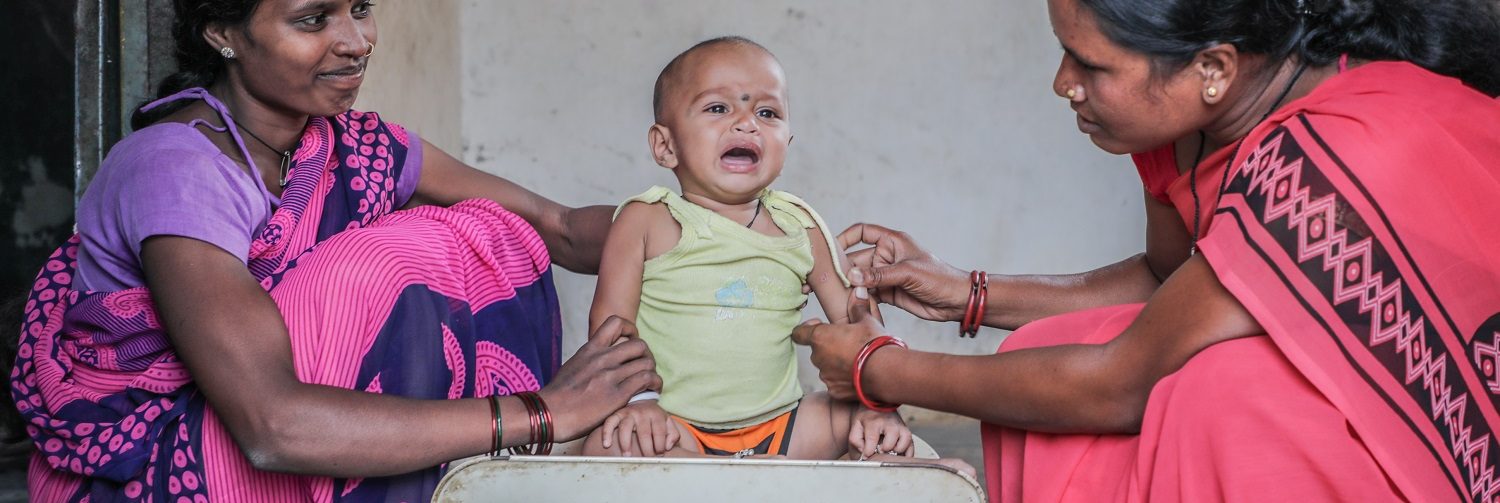
Inaugural session of the workshop on “Strengthening Actions for Nutrition in India” (Image: POSHAN team)
“The multidimensional analysis of National Family Health Survey data will help us navigate the health and nutrition programs, and understand the gaps that must now be closed,” said Dr Vinod Paul from NITI Aayog. He was delivering the keynote address at a knowledge sharing event where multiple researchers from organizations such as International Food Policy Research Institute (IFPRI), Brookings India, International Institute for Population Sciences (IIPS), Society for Applied Studies (SAS), Population Council and more, together with over 130 members of the nutrition community in India, met in New Delhi on September 4, 2018 to deliberate on research findings from the analyses of National Family Health Survey (NFHS) data.
Coinciding with the observance of National Nutrition Month in September, when nation-wide activities are being organized under POSHAN Abhiyaan to address the nutritional challenges, this event on “Strengthening Actions for Nutrition in India: Insights from the National Family Health Survey” was an interface of researchers, policy makers, program implementers and other nutrition stakeholders. It was designed with the long-term view of bringing data and evidence to the fight against malnutrition.
Researchers have been digging deep into the NFHS-4 data, which was released in February 2018, to understand the drivers of India’s progress on malnutrition, assess the emergence of new problems such as overweight and non-communicable diseases, and also assess how policies and programs are reaching target populations. The studies presented at this event took a closer look at childhood stunting, wasting and other nutrition outcomes, to identify the factors that have contributed to some of the improvements that India has seen in the past decade. The research presentations also examined the immediate and underlying determinants of nutrition outcomes, such as infant and young child feeding practices and issues like gender and poverty. Presentations on the reach and scale of nutrition interventions delivered by India’s national programs, gave an opportunity to examine progress in the decade prior to the launch of POSHAN Abhiyaan.
“Through empirical analyses of data from the NFHS-4 surveys shared at this workshop, we want to collectively inform India’s policy efforts by bringing things together on the scope of the nutrition problem, the drivers of nutritional outcomes and the reach and scale of India’s programs,” said Dr Shamika Ravi from Brookings India, one of the co-hosts of this event and lead convener of a network of research institutes working with Brookings India on NFHS-4 data.
Speaking at the policy panel, Dr Ajay Khera, Deputy Commissioner, Ministry of Health and Family Welfare, acknowledged that this is an unprecedented time for accelerating nutrition actions in India. “The analyses presented here are instrumental in pointing to the priority areas and setting the direction of the ongoing programs,” he added.
IFPRI is collaborating with NITI Aayog on several aspects of data analytics and research to support the government’s nutrition efforts. Highlighting the importance of creating a strong data-focused environment to realize the vision of a healthier and malnutrition-free India, Dr. Purnima Menon from IFPRI said, “The research community must continue to distil and synthesize the insights emerging on each of the topical areas that India’s nutrition mission is focused on, and help to bring those insights back to the policy community to shed light on what’s working, what’s not working and what else needs to happen to make India malnutrition-free.”
Please find here the abstracts of papers that were presented and photographs of the event.


